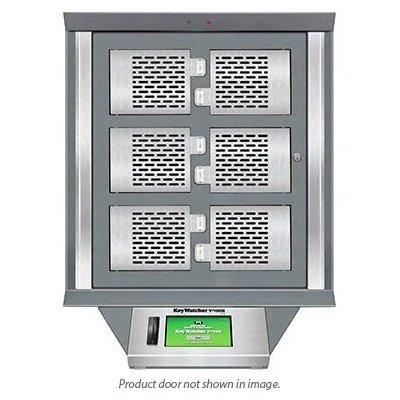 |
Near Field Communication (NFC) has become the newest technology to open a wealth of possibilities for a number of different applications; from enabling users to pay for coffee to opening a door, the sky is the limit. SourceSecurity.com spoke to Klaus Klosa, Managing Director of LEGIC, one of the leading companies taking this exciting technology to the next stage for a number of security applications.
New innovations in NFC from LEGIC
At the SICHERHEIT trade fair in Switzerland last month, LEGIC showcased two of its most important innovations utilising NFC. One of these is Peer-to-Peer communication mode, a new and easy way to configure and maintain system components using NFC. Now available in the LEGIC 4000 reader chip series with the release of the LEGIC OS-4000 V3.0 firmware, it is possible to exchange data between two similar NFC devices.
Peer-to-Peer communication mode helps installers save configuration costs
"With this Peer-to-Peer mode, you can buy an NFC enabled Android phone for instance from Samsung or HTC. The provider of the product, let’s say of the lock, has only to develop an Android application, give that to the installers and they can use their Android phone to set up the locks," said Klaus.
According to Klaus, the main benefit of this innovation is that security installers are able to remove the expensive cost of developing a configuration tool and simply use an NFC enabled phone to configure a component.
"Many application developers are struggling with how to give their customers the right tools for configurations. We have for example customers who use our reader chips for payment for coffee vending machines. Their service people who refill these machines need big devices to set up the pricing and read log files. With this technology, instead of using these devices, they can now use mobile phones to service the vending machines."
Swisscom and Legic are currently working together to create a mobile ecosystem for the Swiss ID market with a view to launching this in 2014 |
LEGIC’s IDConnect service & partnership with Swisscom for a mobile eco-system
At the event, LEGIC also presented its IDConnect service which allows application servers to install all the applications of a contactless card onto NFC-capable mobile phones simply and easily. One of the key things which Klaus said making this technology even more relevant was LEGIC’s announcement of its new partnership with Swisscom, the largest Swiss Mobile Network Operator. Swisscom and LEGIC are currently working together to create a mobile ecosystem for the Swiss ID market, with a view to launching this in 2014.
The result of this cooperation will enable LEGIC to put virtual credentials on the most secure part of the mobile phone, the SIM card. This will enable classic ID functions such as access control, time and attendance recording and vending to be provided safely and easily.
"The most interesting part of IDConnect is that it is not only connected to Swisscom but it is also connected to the back end systems of the application. So the access control system is connected to the other side to our IDConnect service. When someone is operating an access control application, and needs to issue a new card, he will be able to issue it on a mobile phone. The mobile phone number is entered and the credential information is sent to IDConnect, and we process it and forward it to the Mobile Network Operator, Swisscom, who brings the information onto the phone’s SIM card," said Klaus.
Benefits of IDConnect for ID Network
Klaus also mentioned the benefit of IDConnect for its ID network customers: "The ID network customers provide many different applications on cards and can now extend with IDConnect to NFC phones by connecting their background systems. For example, bicycle rental in the city of Lausanne in Switzerland. The rental company’s background systems are connected to IDConnect and they can send virtual credentials to their customers’ NFC mobile phones. IDConnect is also something that the Mobile Network Operators like because they only have to connect to our IDConnect service and they open their mobile phones to thousands of applications."
 |
| LEGIC place the credential on the most secure part of the mobile phone - the SIM card |
This service will be rolled out in stages. So, over a period of time, more applications and more Mobile Network Operators will be available for users. LEGIC has planned to target both North America and Germany to implement this service. Concerning the question of if they will launch this service in the UK, Klaus said: "Here it depends on the readiness of the Mobile Operators."
A different approach to NFC: Putting data on the SIM card
When asked how LEGIC’s approach to utilising NFC differed from the rest of the market, Klaus said: "There are different approaches to putting virtual credentials on an NFC phone. Most of these approaches are dedicated to one supplier and therefore one application. Also, usually they don't put the information on the secure element which is the SIM card, therefore, it is like a normal application on a mobile phone."
"I think our difference is that we really prioritise putting the data on the safest place in a mobile phone which is currently the SIM card. Secondly, IDConnect is open for any kind of application."
Future of NFC: replacement of contactless credit cards will be key application
Having made NFC LEGIC’s focus for the coming year, we asked Klaus what he thought about the uptake of NFC in the industry. "In several countries, they are still not rolling it out actively but that is only the first look at it. Behind the scenes a lot of work is ongoing. Most Mobile Network Operators have installed the necessary systems and are pretty ready to start being rolled out. The lead application in most countries will be for payment, with the replacement of the contactless credit card.
 | Klaus Klosa, Managing Director LEGIC |


















